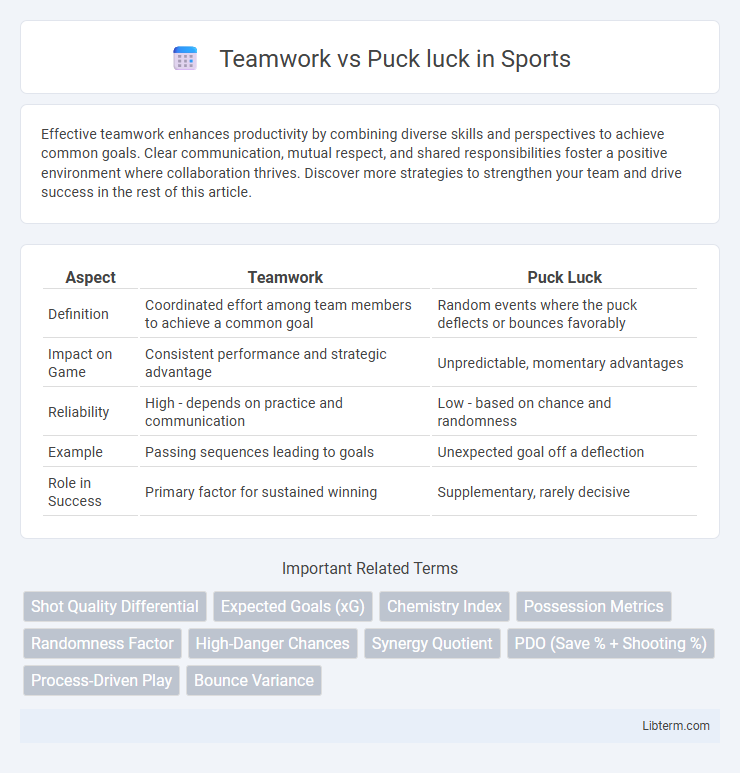Effective teamwork enhances productivity by combining diverse skills and perspectives to achieve common goals. Clear communication, mutual respect, and shared responsibilities foster a positive environment where collaboration thrives. Discover more strategies to strengthen your team and drive success in the rest of this article.
Table of Comparison
| Aspect | Teamwork | Puck Luck |
|---|---|---|
| Definition | Coordinated effort among team members to achieve a common goal | Random events where the puck deflects or bounces favorably |
| Impact on Game | Consistent performance and strategic advantage | Unpredictable, momentary advantages |
| Reliability | High - depends on practice and communication | Low - based on chance and randomness |
| Example | Passing sequences leading to goals | Unexpected goal off a deflection |
| Role in Success | Primary factor for sustained winning | Supplementary, rarely decisive |
Defining Teamwork and Puck Luck
Teamwork in hockey involves coordinated efforts of players to control the puck, execute strategic plays, and create scoring opportunities through passing and positioning. Puck luck refers to the unpredictable and uncontrollable moments where the puck takes favorable bounces or deflects, influencing game outcomes beyond skill and strategy. Understanding the balance between deliberate teamwork and the randomness of puck luck is crucial for analyzing team performance and success.
The Role of Teamwork in Hockey Success
Teamwork in hockey is a critical factor that drives consistent success by enabling seamless passing, strategic positioning, and coordinated plays that maximize scoring opportunities. Unlike puck luck, which is unpredictable and often situational, teamwork leverages collective skills and communication to maintain control of the game and adapt effectively to opponents. Teams that emphasize strong collaboration and tactical cohesion consistently outperform those relying on chance events or individual brilliance.
Understanding the Concept of Puck Luck
Puck luck refers to the random and often unpredictable events in hockey that influence the outcome of games, such as lucky bounces or deflections that benefit one team over another. While teamwork emphasizes strategic coordination, skill execution, and consistent effort, puck luck highlights the element of chance that can momentarily sway results despite team performance. Understanding puck luck is crucial for analyzing game outcomes beyond statistics and recognizing the role of randomness in hockey success.
Historical Examples: Teamwork Triumphs vs Lucky Breaks
Historical examples demonstrate that teamwork consistently outperforms sheer luck, as seen in the 2004 Boston Red Sox World Series victory, where coordinated strategy and collaboration ended an 86-year championship drought. In contrast, the 1999 World Series featured the New York Yankees benefiting from lucky breaks, such as a crucial error by the Atlanta Braves, yet their overall success relied heavily on disciplined teamwork. These cases highlight how sustained teamwork builds a foundation for triumph, while lucky breaks offer only temporary advantages.
The Statistical Impact of Luck in Games
Teamwork consistently enhances performance by improving communication, coordination, and strategic execution, which statistically correlates with higher win rates in competitive games. Puck luck, or random chance affecting puck bounces and game outcomes, introduces variability but does not significantly alter long-term performance metrics when large sample sizes are analyzed. Statistical models demonstrate that while luck can impact individual games, sustained success is predominantly driven by effective teamwork and skill development.
Strategies to Maximize Teamwork
Effective teamwork strategies in hockey involve clear communication, role clarity, and synchronized positioning to create scoring opportunities and enhance defensive coverage. Implementing structured passing sequences and systematic forechecking strengthens collective puck control and pressure, minimizing reliance on individual puck luck. Consistent practice of set plays and adaptive in-game adjustments fosters reliability, turning team cooperation into a decisive advantage over unpredictable puck bounces.
Can Teams Control Puck Luck?
Teams can influence puck luck by consistently executing high-quality shots, maintaining puck possession, and applying sustained pressure, which statistically increases scoring opportunities. Advanced metrics like expected goals (xG) reveal that teams emphasizing strategic teamwork reduce reliance on random puck bounces, effectively skewing luck in their favor. Although some elements of puck luck are uncontrollable, disciplined gameplay and skillful passing directly improve a team's ability to control game outcomes.
Players’ Perspectives: Skill or Fortune?
Players often debate whether success in hockey hinges more on teamwork or puck luck, emphasizing skill development and strategic coordination as key factors in consistent performance. Individual talent and effective communication enhance team dynamics, reducing reliance on unpredictable elements like puck luck. While fortuitous bounces can influence game outcomes, professional athletes prioritize honing skills and synchronizing efforts to increase their competitive edge.
Balancing Preparation and Unpredictability
Effective hockey performance hinges on balancing meticulous teamwork with the unpredictability of puck luck to maximize scoring opportunities. Teams that emphasize strategic preparation, such as set plays and coordinated positioning, reduce reliance on chance and enhance consistent results. Simultaneously, embracing puck luck--random deflections, unpredictable bounces--can create high-impact moments when combined with adaptive teamwork, ensuring resilience against the sport's inherent uncertainties.
Conclusion: Building Success Beyond Luck
Sustainable success in hockey hinges on effective teamwork rather than relying on puck luck, which is inherently unpredictable. Teams that prioritize coordinated strategies, communication, and skill development consistently outperform those dependent on random chance. Cultivating a strong team dynamic creates a foundation for long-term achievement beyond the variability of luck.
Teamwork Infographic

 libterm.com
libterm.com